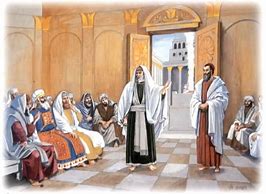Preaching and the Politics of Peter
Preaching and the Politics of Peter
In the last several posts we reflected on preaching and politics. We’ve looked at the politics of Jesus, as well as the priority of preaching the Gospel. Today we will consider preaching and the politics of Peter as he expressed it in his first letter. In the next post, we’ll look at Preaching and the Politics of Paul.
Peter and Politics
Peter is one of the most fascinating characters in the New Testament when it comes to preaching and politics. In his first letter he gives this guideline about relating to the government:
Submit yourselves for the Lord’s sake to every human authority: whether to the emperor as the supreme authority, or to governors who are sent by him to punish those who do wrong and to commend those who do right. For it is God’s will that by doing good you should silence the ignorant talk of foolish people. (I Peter 2:13-15)
Charles Swindoll gives this commentary on these verses:
 Looking at the historical situation in which Peter is writing is helpful. This command to submit to civil authority comes during the reign of the cruel and tyrannical Roman emperor Nero. He was a dictatorial, insane, demagog who was notorious for his persecution and hatred of Christians. Many who received this letter had suffered under Roman Empire sponsored persecution of Christians. [Swindol, Charles. Hope Again. 1996 Thomas Nelson. Nashville, TN. p. 85.]
Looking at the historical situation in which Peter is writing is helpful. This command to submit to civil authority comes during the reign of the cruel and tyrannical Roman emperor Nero. He was a dictatorial, insane, demagog who was notorious for his persecution and hatred of Christians. Many who received this letter had suffered under Roman Empire sponsored persecution of Christians. [Swindol, Charles. Hope Again. 1996 Thomas Nelson. Nashville, TN. p. 85.]
The submission principle
Yet Peter counsels submission. The word submit here is one of those wonderful picture words from the military. It means to “rank yourself under”. In the military, the private is ranked under the sergeant, the sergeant under the lieutenant, the lieutenant under the captain, etc. The task of those who are ranked under is to obey those who are ranked over.
It means to “rank yourself under”. In the military, the private is ranked under the sergeant, the sergeant under the lieutenant, the lieutenant under the captain, etc. The task of those who are ranked under is to obey those who are ranked over.
Peter is saying here, “Rank yourself under the government.” Even if Nero is the emperor.
But Peter also disobeyed government

Peter and John before the Sanhedrin
This seems a bit strange, doesn’t it, when we consider what we read in Acts 4. After the authorities arrested Peter and John in connection with the healing of the lame man at the temple gate, they ordered them to not speak any longer in the name of Jesus. Here is Peter’s response:
But Peter and John replied, “Which is right in God’s eyes: to listen to you or to him? You be the Judges! As for us, we cannot help speaking about what we have seen and heard.” (Acts 4:19-20)
Here we have another principle to follow when thinking about preaching and the politics of Peter in the New Testament. There are times that the government should be disobeyed. When should that be?
What They Can Control

Covenant Life Staff Prayer
Let’s think of it in terms of the situation in most modern democracies. The city in which my church resides is Grand Haven, MI. The City authorities make rules about my church. They limit the number of people that can legally be in the building as part of the safety code. Their concern is about a possible fire in the building. They also have codes that must be met when we expand our building, so that any expansion is safe for the people who will enter. They have a right to make these restrictions.
When We Should Rebel
But the civil authorities have no right to tell us what we may or may not preach or teach. They have no control over our mission statement. They may not control our membership standards. If they attempt to control things like that, we should rightly rebel.
So, when we consider preaching and the politics of Peter we will be very careful about rebelling over the wrong things.
In the next post, we’ll consider preaching and the politics of Paul, and we’ll see that there are likely other times when we should rebel against government control.



